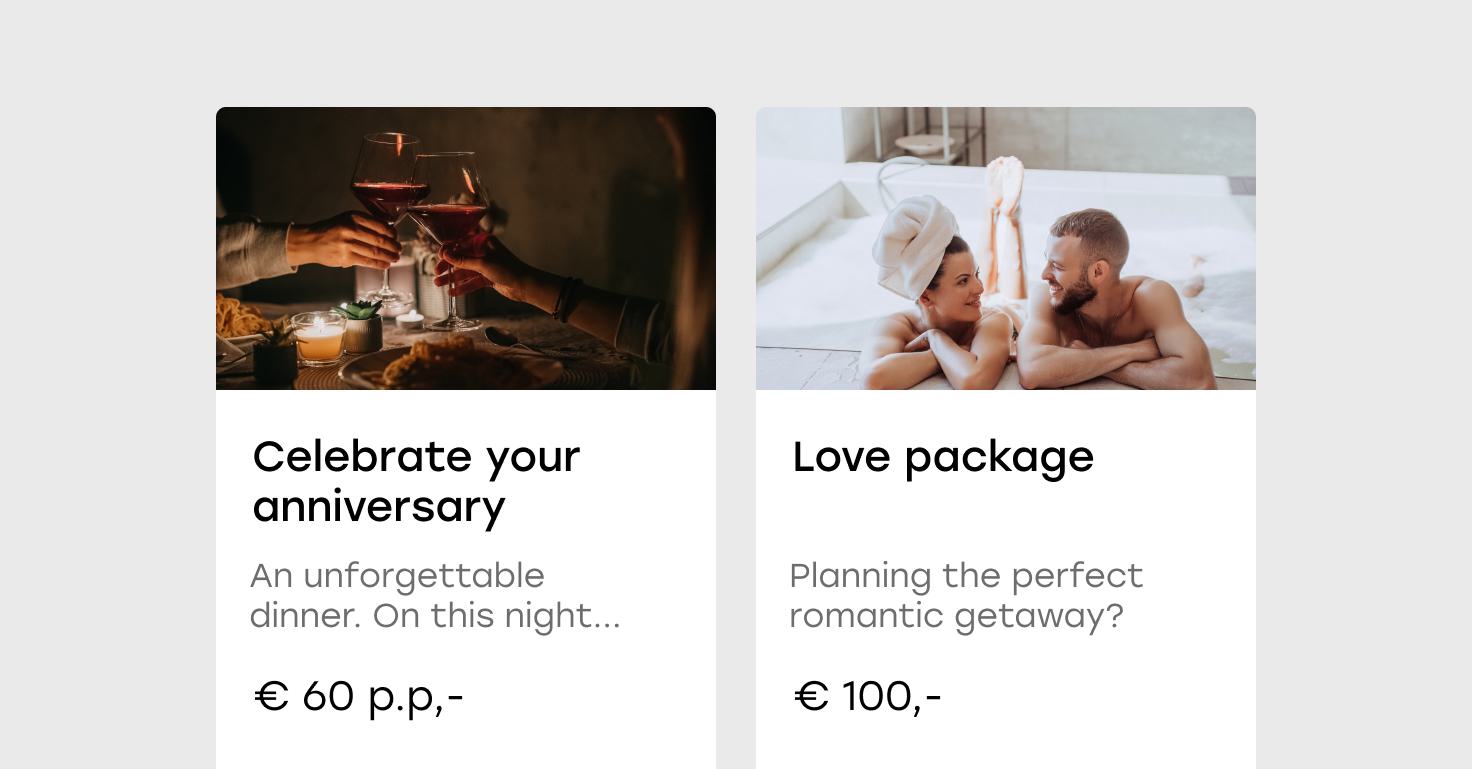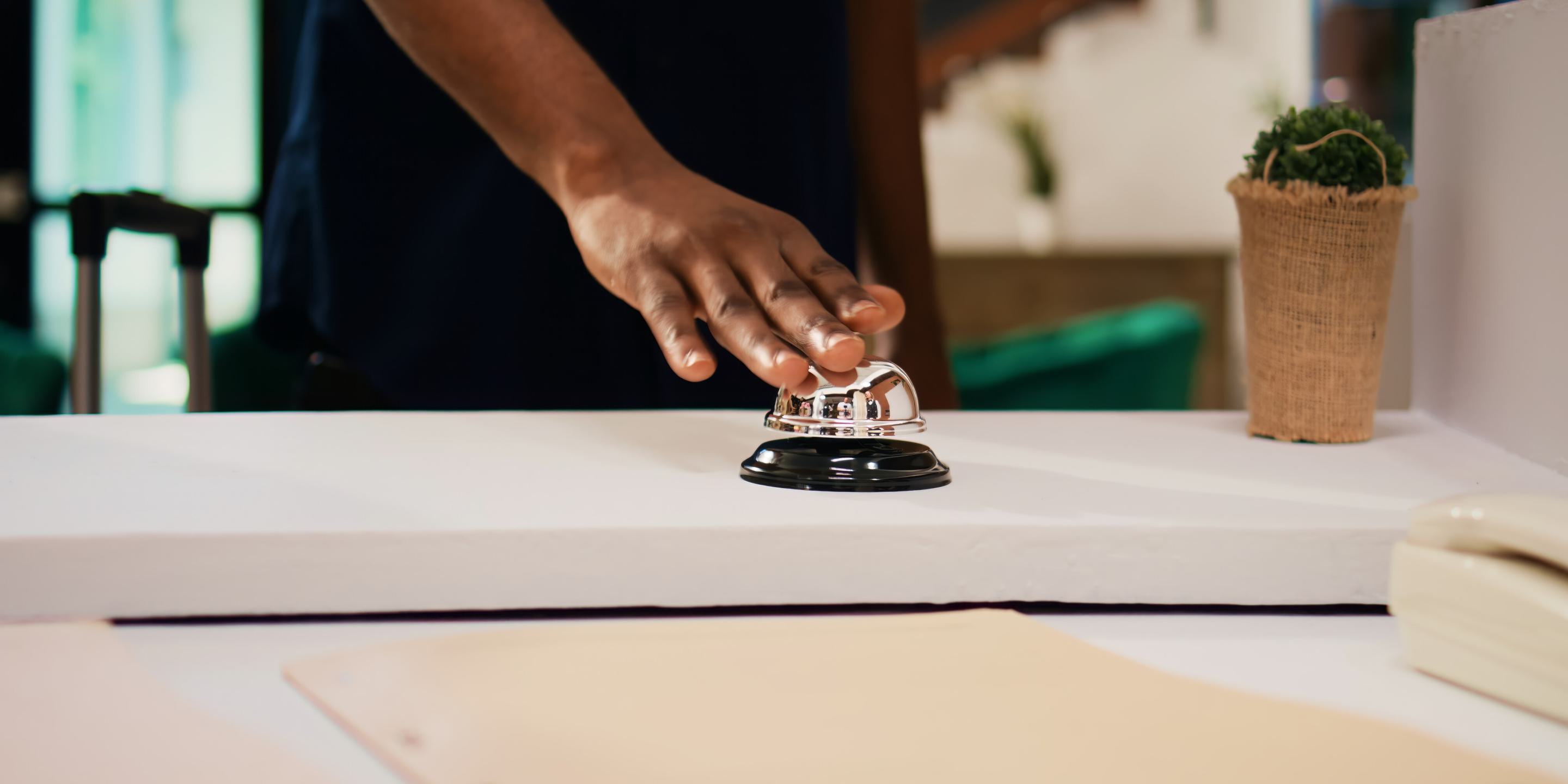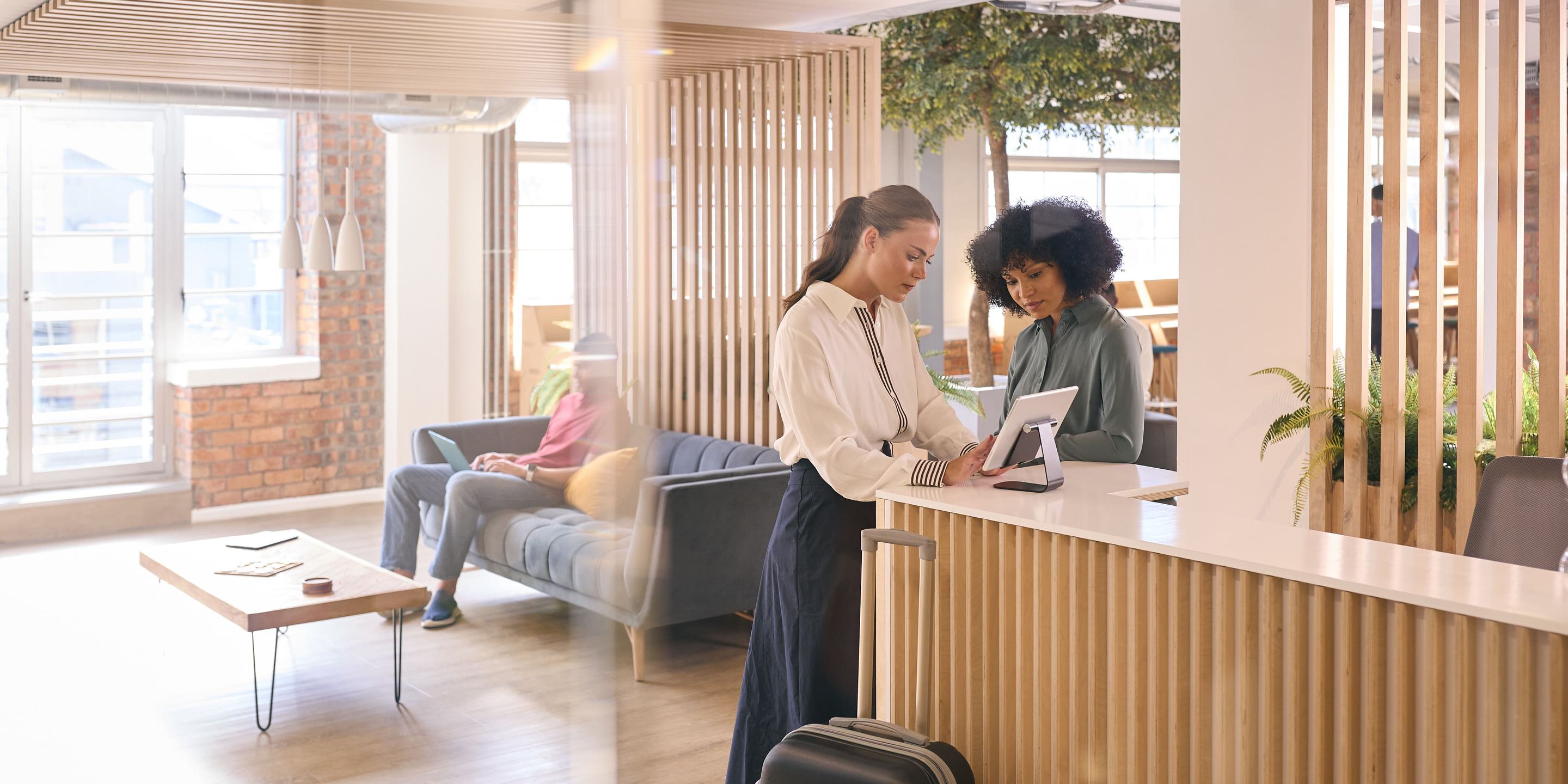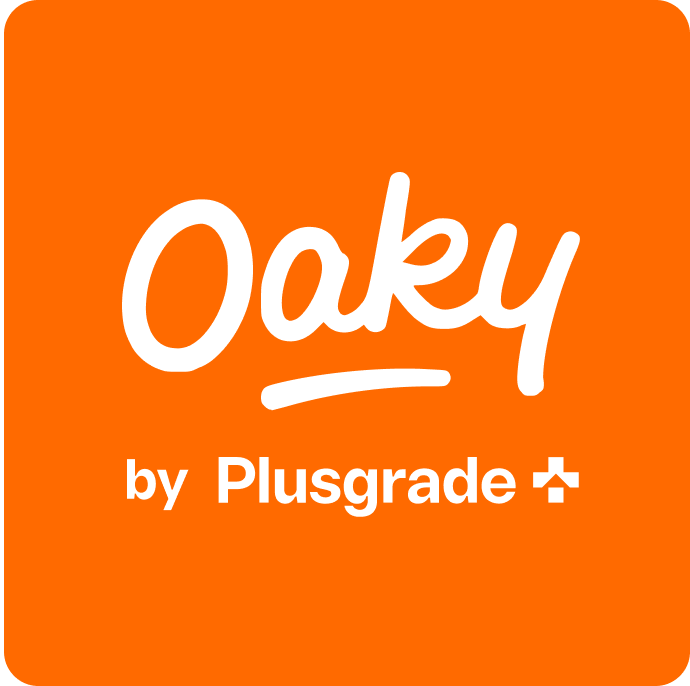Welcoming and greeting hotel guests: 19 Impactful ways
Oaky
•

Here's a hard truth: you never get a second chance to make a first impression. What's more, those first few seconds often create a lasting impression, making it even more important that you train your hotel staff in the art of welcoming and greeting hotel guests.
If you fail to offer a guest a warm welcome, it can overshadow their entire experience. And, a welcome greeting is more than simply a smile and wishing them a wonderful stay.
It's about knowing how to carry yourself and which questions to ask and when. Here are the top techniques commonly used to greet hotel guests and set them up for a pleasant stay, as well as tech solutions to help you nail first impressions about your hotel.
It takes only seven seconds to form a first impression about someone. This is why it's crucial to get your first encounter with hotel guests right. Here's how you can do that time after time:
1. Greet hotel guests with a smile
A warm smile is a universal symbol of kindness. It is even more valuable in the hospitality business where you’re dealing with guests from all over the world. When a guest arrives for check-in, a simple smile can let guests feel welcome instantly. It can also help let a guest feel comfortable in an unfamiliar environment.
2. Have a firm handshake
A firm handshake is an important skill, especially for a hotel manager. According to data, a firm handshake is linked with warmth, positivity, emotional expressiveness, and gregariousness.
To ensure that you come across as welcoming, use an open, approaching attitude by reaching out with your hand palm up. You want the skin between your thumb and forefinger to connect with your guest's hand in the same spot. The duration of the handshake is also important and research suggests that two to three seconds seem to be the norm.
3. Establish connection with good eye contact
Along with a warm smile and firm handshake, eye contact is another way you can use body language to let your guests feel special and at home. It's one of the first stepping stones in building rapport.
What makes eye contact such a useful technique in the hospitality industry is that it helps you to communicate with guests at the front desk while you're busy on the telephone or with other guests. Making eye contact with guests waiting patiently for service can help them feel acknowledged, helping to prevent annoyance.
4. Greet your guests verbally and introduce yourself
If you make eye contact with a guest from across the room, a smile is enough. However, if the guest is right at the front desk, you can't rely just on nonverbal communication. In this case, you'll need to greet your guests verbally by, for example, saying, “Welcome, good morning. I'm John.”
The key is to be sincere and professional. If it's the first time that you meet the guest, keep the greeting more formal. You can dial back the formality when you see the guest again.
5. Maintain a polished appearance and outfit
If your staff wears a uniform, it helps guests to find the right assistance quickly. A neat appearance can also improve your brand's image, making it easier for guests to trust your level of service. It doesn't necessarily have to be a traditional uniform.
As long as all hotel staff are dressed in the same style and their hair and nails are neat, your staff will create a good impression.
The emphasis is on neatness. Considering the role that cleanliness plays in the hotel industry, you can't afford to let the appearance of your hotel employees suggest otherwise.
6. Call your guest by their first name
If you know your hotel guest's first name, you can use it when greeting them. This will help to build rapport, personalize the guest experience, and let the guest feel valued.
7. Ask relevant questions
Body language is key, but only so much can be communicated without engaging in conversation. To build on the rapport that you've established by greeting guests warmly, identify an opportunity for asking guests questions about their travel plans and expectations.
It can usually be a good time to ask these types of questions while they're checking in. Keeping these questions open-ended works best.
By enquiring about their itinerary, you can make the paperwork feel like less of a drag. It can also give you the perfect chance to upsell some of your deals.
Here are some questions that you can ask:
“What have you heard about our hotel?”
“What brings you to London?”
“Are you aware of what's happening this weekend?”
“Do you have any breakfast plans?”
What's more, by building rapport with your guests and uncovering their hidden needs and wants by asking questions, you can tailor your upsell suggestions. Tailored upsell recommendations are more likely to be appreciated by guests, letting them make use of hotel facilities and amenities they might not know about and enabling you to craft a truly unforgettable stay.
8. Make your guest feel special
Before guests check in, double-check to see if they'll perhaps be celebrating a birthday or special occasion like an anniversary, engagement, etc., during the course of their stay.
At the very least, you should congratulate them in person. You can also go the extra mile and throw in a freebie like a complimentary breakfast.
Depending on the special occasion, you can also turn it into anotheropportunity to upsell some of your extra services. For example, if the booking was made by one of the partners to celebrate their 10-year anniversary, you can suggest creative ideas like a special anniversary dinner at the hotel's restaurant and a surprise welcome gift in the room.

9. Provide a welcome drink or treat
Offering a welcome drink or treat is a simple but effective way to show guests they're valued from the moment they arrive. A refreshing beverage—think chilled juice, sparkling water, or a signature cocktail—helps set the tone for their stay. Or, surprise and delight them with seasonal, locally sourced snacks or baked goods that give a taste of the region. These small gestures go a long way to making guests feel welcome and setting the stage for an enjoyable guest experience.
10. Offer help and check if there's anything else that you can do
After welcoming your guests and informing them about other services, enquire if they need help with anything else. If a guest politely declined, leave it at that. If you insist on carrying their luggage or showing them to their room, for example, your guests can feel overwhelmed or irritated.
11. Offer valuable tips about the location
Help your guests feel more connected to the destination by providing insider tips about the local area and local attractions.
According to a study, 70% of travelers value local recommendations from hotel staff over generic tourist guidebooks. Whether it's suggesting hidden gems for dining, must-see attractions, or off-the-beaten-path experiences, these tips make their stay more authentic. To really bring your local tips to life, give guests a map or itinerary that highlights some unique activities nearby. And to add a personal touch, point out any local events or festivals happening during their stay – it's a great way to give them an exclusive experience.
12. Read body language and learn how to control yours
As mentioned, your body language plays a key role in welcoming guests, whether you like it or not. As such, it's crucial that you practise maintaining the right posture and maintaining good eye contact.
Just like your own body language is a communication tool, a hotel guest's body language can also reveal valuable information. For example, if a guest stands with their arms crossed and avoids eye contact, it could indicate that they're in a hurry. In this case, it's best to keep your conversation minimal and leave any upselling for another time.
13. Communicate accurate wait times
Accurately communicating wait times is crucial in enhancing guest satisfaction during hotel check-ins. Studies reveal that exceeding a five-minute wait can lead to a 47% drop in guest satisfaction among US travelers.
To mitigate this, provide realistic wait time estimates or consider implementing mobile check-in options.
Another option is to implement a hotel upsell solution like Oaky to save time presenting upselling options at check-in. Oaky is handy for suggesting tailored room upgrades, add-ons, and services to guests at the right times before arrival so your agents can dedicate time at check-in to a proper welcome and to presenting more high-margin deals.

14. Look for needs
Different guests have different needs. For example, luxury travelers will look for high-end experiences, while it could cost you family travelers' support. At the reception desk, try to identify the guest personas and cater to them in such a way that you'll meet their expectations.
You can also use smart hotel tech solutions like Oaky. Oaky's Front Desk Upsell module is specifically designed to empower you with upsell prompts in real time based on your guest segments. This way, your guests can enjoy personalized service while you can increase your bottom line by upselling room upgrades and services during check-in in a more streamlined way.
Your front desk agents get access to all the relevant information they need for successful upsells, including the guest details, the availability of room upgrades, special offers as well as up-to-date pricing (which is extremely beneficial if you use revenue management software like Duetto or IDeaS).
15. Celebrate special occasions
If your guests are celebrating something special—a birthday, anniversary, or maybe even their honeymoon—make sure to acknowledge it. A thoughtful welcome note or offering a personalized experience like a private tour, a signature spa treatment, or a romantic dinner shows you care and goes a long way toward ensuring a stellar guest experience.
16. Point out areas of interest within the hotel
To help your guest settle in, take a few minutes to point out where amenities such as the restaurant, curio shop, and spa are located.
17. Anticipate guest questions and provide answers to them
While each and every guest is unique and has their own expectations, there are several frequently asked questions, such as what's the Wi-Fi password. Instead of waiting for the guest to ask for certain information, have the answers ready. You can, for example, include a FAQ section in your pre-arrival emails or welcome book.
18. Explain any hotel special policies or procedures
Make sure to walk guests through the hotel's policies and procedures at check-in to ensure a smooth and stress-free stay. Studies show that guests feel more comfortable when hotel policies, such as check-out times or cancellation terms, are communicated upfront. This transparency helps manage expectations and prevent misunderstandings during the stay. Take the time to briefly go over key policies, such as:
Quiet hours
Pet policies,
Security procedures
Checkout time.
19. Ensure an efficient check-in process
No one likes waiting in long lines to check in, so make this process as quick and easy as possible. Think about a fast-track option for guests who've already filled out their forms or provide a mobile check-in option.
Make sure your front desk staff are trained to be both efficient and friendly, greeting each guest personally. Contactless payments and pre-authorized cards with digital receipts also speed things up.

Things to avoid when greeting and welcoming your guest
The last thing you want is for all your effort at making the hotel guests feel welcome to fall flat because of one mistake. The following are four of the most common pitfalls to avoid at all costs:
1. Not making eye contact
Avoiding eye contact can indicate more than just low confidence or shyness. In fact, hotel guests can take it personally. It can leave them feeling as if the staff member is in a hurry or disinterested. Both these scenarios can suggest to the hotel guest that the hotel is ungrateful for their patronage.
2. Ignoring a guest when being busy
If you're busy with another guest or taking a telephone call, acknowledge that you see the next guest in line with a friendly nod and smile. However, if you're busy with admin work, pause what you're doing and attend to the quest first.
3. Showing a lack of interest in the conversation
There's a difference between anticipating guest questions and assuming a guest's preferences. If you think that you know what they're interested in or need, you run the risk of coming across as disinterested.
Not only will you fail to catch clues that could make your hotel front desk upselling efforts more effective and overall service delivery more efficient, but you'll also leave the guest feeling unvalued.
4. Bad body language
You could be asking all the right questions, but if your body language doesn't reinforce your verbal communication, your guests will draw unfavorable conclusions. For example, if you're slouching, guests could think that you're either lazy or their conversation is boring. A seemingly insignificant gesture, like crossed arms, can carry a lot of weight, with several studies suggesting that nonverbal communication accounts for at least 70% of all communication.
How hotel technology can contribute to making a strong first impression
Using hotel tech to improve the check-in process can go a long way. It's all about speed and personalization, and solutions and tools like the following can help hoteliers ensure a positive first impression:
Hotel upsell software like Oaky can help create a positive first impression. Thanks to pre-arrival emails with upsell deals and add-ons that are customised to your hotel's brand, your guests can discover your brand and your hotel values whenever is most convenient to them.
Moreover, Oaky also enables the front desk staff to know who is standing in front of them and how to cater to the needs of their guests better using Front Desk Upsell automation software. Front Desk Upsell automation will assist you with the relevant information about the guest, and guest segment as well as room and service live availability and pricing.

